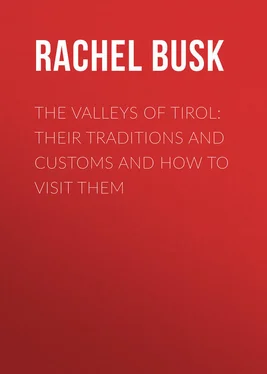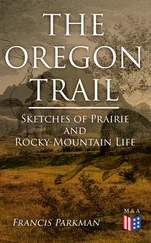Rachel Busk - The Valleys of Tirol - Their traditions and customs and how to visit them
Здесь есть возможность читать онлайн «Rachel Busk - The Valleys of Tirol - Their traditions and customs and how to visit them» — ознакомительный отрывок электронной книги совершенно бесплатно, а после прочтения отрывка купить полную версию. В некоторых случаях можно слушать аудио, скачать через торрент в формате fb2 и присутствует краткое содержание. Жанр: foreign_antique, foreign_prose, Путешествия и география, на английском языке. Описание произведения, (предисловие) а так же отзывы посетителей доступны на портале библиотеки ЛибКат.
- Название:The Valleys of Tirol: Their traditions and customs and how to visit them
- Автор:
- Жанр:
- Год:неизвестен
- ISBN:нет данных
- Рейтинг книги:3 / 5. Голосов: 1
-
Избранное:Добавить в избранное
- Отзывы:
-
Ваша оценка:
- 60
- 1
- 2
- 3
- 4
- 5
The Valleys of Tirol: Their traditions and customs and how to visit them: краткое содержание, описание и аннотация
Предлагаем к чтению аннотацию, описание, краткое содержание или предисловие (зависит от того, что написал сам автор книги «The Valleys of Tirol: Their traditions and customs and how to visit them»). Если вы не нашли необходимую информацию о книге — напишите в комментариях, мы постараемся отыскать её.
The Valleys of Tirol: Their traditions and customs and how to visit them — читать онлайн ознакомительный отрывок
Ниже представлен текст книги, разбитый по страницам. Система сохранения места последней прочитанной страницы, позволяет с удобством читать онлайн бесплатно книгу «The Valleys of Tirol: Their traditions and customs and how to visit them», без необходимости каждый раз заново искать на чём Вы остановились. Поставьте закладку, и сможете в любой момент перейти на страницу, на которой закончили чтение.
Интервал:
Закладка:
Before closing my chapter on Vorarlberg I must put on record, as a warning to those who may choose to thread its pleasant valleys, a laughable incident which cut short my first attempt to penetrate into Tirol by its means. Our line of route I have already named. 40Our start was in the most genial of August weather; our party not only harmonious, but humorously inclined; all our stages were full of interest and pleasure, and their memory glances at me reproachfully as I pass them over in rigid obedience to the duty of adhering to my programme. But no, I must devote a word of gratitude to the friendly Swiss people, and their kindly hospitable manners on all occasions. The pretty bathing establishments on the lakes, where the little girls go in on their way to school, and swim about as elegantly as if the water were their natural element; the wonderful roofs of Aarau; its late-flowering pomegranates; and the clear delicious water, tumbling along its narrow bed down the centre of all the streets, where we stop to taste of the crystal brook, using the hollow of our hands, pilgrim fashion, and the kind people more than once come out of their houses to offer us glasses and chairs!
I must bestow, too, another line of record on the charming village of Rorschach, the little colony of Catholics in the midst of a Protestant canton. Its delicious situation on the Boden-see; our row over the lake by moonlight, where we are nearly run down by one of the steamers perpetually crossing it in all directions, while our old boatman pours out and loses himself in the mazes of his legendary lore; the strange effect of interlacing moonbeams, interspersed by golden rays from the sanct lamps with Turner-like effect, seen through the open grated door of the church; the grotesque draped skeletons supporting the roof of one of the chapels, Caryatid fashion and the rustic procession on the early morning of the Assumption.
So far all had gone passing well; my first misgiving arose when I saw the factotum of the Oberriet station eye our luggage, the provision of four English winterers in Rome, and a look of embarrassed astonishment dilate his stolid German countenance. It was evident that when he engaged himself as ticket-clerk, porter, ‘and everyting ,’ he never contemplated such a pile of boxes being ever deposited at his station. We left him wrapt in his earnest gaze, and walked on to see what help we could get in the village. It was a collection of a half-dozen cottages, picturesque in their utter uncivilization, clustered round an inn of some pretensions. The host had apparently heard of the depth of English purses, and was delighted to make his premières armes in testing their capacity. Of course there was ‘no arguing with the master of’ the only horses to whose assistance we had to look for carrying us beyond the mountains, which now somehow struck us as much more plainly marked on the map than we had noticed before. His price had to be ours, and his statement of the distance, about double the reality, had to be accepted also. His stud was soon displayed before us. Three rather tired greys were brought in from the field, and made fast (or rather loose) with ropes to a waggon, on which our formidable Gepäck was piled, and took their start with funeral solemnity. An hour later a parcel of boys had succeeded in capturing a wild colt destined to assist his venerable parent in transporting ourselves in a ‘shay,’ of the Gilpin type, and to which we managed to hang on with some difficulty, the wild-looking driver good-naturedly volunteering to run by the side.
Off we started with the inevitable thunder of German whip-cracking and German imprecations on the cattle, sufficient for the first twenty paces to astonish the colt into propriety. No sooner had we reached the village boundary, however, than he seemed to guess for the first time that he had been entrapped into bondage. With refreshing juvenile buoyancy he instantly determined to show us his indomitable spirit. Resisting all efforts of his companion in harness to proceed, he suddenly made such desperate assault and battery with his hind legs, that one or two of the ropes were quickly snapped, the Jehu sent sprawling in the ditch on one side, and the travelling bags on the other; so that, but for the staid demeanour of the old mare, we should probably in two minutes more have been ‘nowhere.’ Hans was on his feet again in an instant, like the balanced mannikins of a bull-fight, and to knot the ropes and make a fresh start required only a minute more; but another and another exhibition of the colt’s pranks decided us to trust to our own powers of locomotion.
A bare-footed, short-petticoated wench, who astonished us by proving that her rough hands could earn her livelihood at delicate ‘Swiss’ embroidery, and still more by details of the small remuneration that contented her, volunteered to pilot us through the woods where we had quite lost our way; and finding our luggage van waiting on the banks of the Rhine for the return of the ferry, we crossed with it and walked by its side for the rest of the distance.
Our road lay right across the Ardetzen, a basin of pasture enclosed by a magnificent circuit of mountains, – behind us the distant eminences of Appenzell, before us the great Rhætian Alps, and at their base a number of smiling villages each with its green spire scarcely detaching from the verdant slopes behind. The undertaking, pleasant and bright at first, grew weary and anxious as the sun descended, and the mountains of Appenzell began to throw their long shadow over the lowland we were traversing, and yet the end was not reached. At last the strains of an organ burst upon our ears, lights from latticed windows diapered our path, and a train of worshippers poured past us to join in the melodies of the Church, sufficiently large to argue that our stopping-place was attained. We cast about to find the Gasthof zur Post to which we were bound, but all in vain, there was no rest for us.
Here indeed, Feldkirch fuit , but here it was no more. In the year 909, the Counts of Montfort built themselves a castle on the neighbouring height of Schattenburg, (so called because the higher eminences around shade it from the sun till late in the morning,) and lured away the people from this pristine Feldkirch to settle themselves round the foot of their fortress. Some of the original inhabitants still clung to the old place, and its old Church of St. Peter, that very church whose earlier foundations, some say, were laid by monks from Britain, S. Columban and St. Gall, who, when the people were oppressed by their Frankish masters, came and lived among them, and by their preaching and their prayers rekindled the light of religion, working out at the same time their political relief; the former subsequently made his way, shedding blessings as he went, on to Italy, where he died at the age of ninety, in 615; the latter founded, and ended his days at the age of ninety-five, in the famous monastery which has given his name to the neighbouring Swiss Canton.
The descendants of this remnant have kept up the original settlement to this day with the name of Altenstadt, while the first built street of the present thriving town of Feldkirch still retains its appellation of the Neustadt.
It seemed a long stretch ere we again came upon an inhabited spot, but this time there was no mistake. All around were the signs of a prosperous centre, the causeways correctly laid out, new buildings rising on every side, and – I am fain to add – the church dark and closed; in place of the train of worshippers of unsophisticated Altenstadt, one solitary figure in mourning weeds was kneeling in the moonlight at a desk such as we often see placed under a cross against the outer wall of churches in Germany.
Before five next morning I was awakened by the pealing organ and hearty voices of the Feldkirch peasants at Mass in the church just opposite my window. I dressed hastily, and descended to take my place among them. It was a village festival and Mass succeeded Mass at each of the gaily decorated altars, and before them assembled groups in quaint costumes from far and near. 41As each half hour struck, a bell sounded, and a relic was brought round to the high altar rails, all the women in the church going up first, and then all the men, to venerate it.
Читать дальшеИнтервал:
Закладка:
Похожие книги на «The Valleys of Tirol: Their traditions and customs and how to visit them»
Представляем Вашему вниманию похожие книги на «The Valleys of Tirol: Their traditions and customs and how to visit them» списком для выбора. Мы отобрали схожую по названию и смыслу литературу в надежде предоставить читателям больше вариантов отыскать новые, интересные, ещё непрочитанные произведения.
Обсуждение, отзывы о книге «The Valleys of Tirol: Their traditions and customs and how to visit them» и просто собственные мнения читателей. Оставьте ваши комментарии, напишите, что Вы думаете о произведении, его смысле или главных героях. Укажите что конкретно понравилось, а что нет, и почему Вы так считаете.












